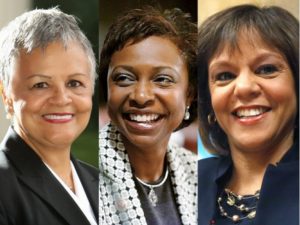Women’s History Month and Black History Month collided and created the first congressional Black Women and Girls Caucus!
Three African-American female lawmakers announced its launch with a new congressional caucus to support the lives of Black women and girls through policy discussions and promoting legislation that addresses the socio-economic disadvantages Black women and girls face.
The announcement was a historic victory for the many who have critiqued the nation’s lack of attention to issues that affect Black women and girls, such as health, education, safety and economic well being.
U.S. Reps. Bonnie Watson Coleman (D-N.J.), Robin Kelly (D-Ill.) and Yvette D. Clarke (D-N.Y.) confirmed the news in a press release issued by the U.S. House of Representatives on Tuesday, March 22.
The congresswomen described the formation of the caucus as “the first caucus devoted to public policy that eliminates the significant barriers and disparities experienced by Black women.”
Currently, there are more than 430 registered congressional caucuses, some of which include: a bike caucus, flower caucus, gaming caucus and sugar caucus. Similar to the Black Men and Boys Caucus launched February 2015, the Black women and girls caucus is the first and only that puts black women and their needs at the forefront.
“The Congressional Caucus on Black Women and Girls gives black women a seat at the table for the crucial discussion on the policies that impact them while also providing a framework for creating opportunities and eliminating barriers to success for black women,” Rep. Kelly said.
While Black women and girls have made significant achievements, having surpassed any other group in both race and gender by being the most educated and largest voting bloc we are still disproportionately affected by issues that negatively impact the quality of life for us, our families, and our communities.
“From barriers in education to a gender-based pay gap that widens with race, to disparities in both diagnoses and outcomes for many diseases, our society forces black women to clear many hurdles faced by no other group and asks them to do it with little assistance,” states Watson Coleman. “Black women deserve a voice in a policy making process that frequently minimizes, or altogether ignores the systemic challenges they face. This caucus will speak up for them.”
From economic disparities, to high rates of being victims of domestic and sexual violence, to negative interactions with law enforcement, Black women and girls require specialized and committed attention to reverse the bearing that leave them vulnerable and suppress their success.
The numbers are staggering, but clear:
- Black women are paid 64 percent of what White men are paid. Additionally, The U.S. Bureau of Labor reports that the percentage of Black women who are full-time minimum-wage workers is higher than that of any other racial group.
- The American Civil Liberties Union found that Black women represent 30 percent of all women incarcerated in US prisons, despite making up just 13 percent of the US female population.
- A 2013 report by the NAACP Legal Defense Fund cited that a Black woman with a bachelor’s degree can typically expect an increase of about $657,000 in lifetime earnings when compared with a Black woman with a high school diploma. The same study showed that even when Black women enroll in college, they have low completion rates.  Among Black women who started full-time bachelor programs at four year institutions, for the first-time, only 44 percent received their bachelor’s degree within six years.
The caucus was inspired by Ifeoma Ike, the co-founder of Black and Brown People Vote, and a collective of six other women involved in the #SheWoke committee which is comprised of leading black women activists who consistently advocate for black women’s rights, including Ike, Nakisha M. Lewis, Tiffany D. Hightower, Shambulia Gadsden Sams, Sharisse Stancil-Ashford, Dr. Avis Jones-DeWeever and Sharon Cooper.
The mission of the Congressional Black Women and Girls Caucus is to examine policies that will help reduce disparities in quality of life that heavily affect Black women in America. It is incredibly important because it gives Black women real hope in both the work they do and their personal lives.
The launch reception of the Congressional Caucus on Black Women and Girls was held on April 28 in Washington, D.C.
-Danyelle R. Carter
Junior Girl
Girl Museum Inc.


Excellent Opportunity for young women to become aware of their civil and human rights.